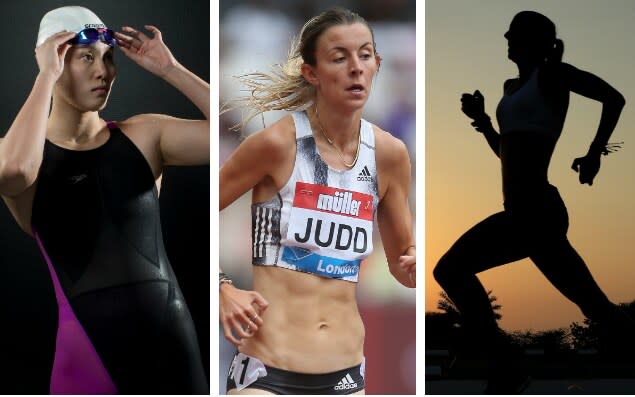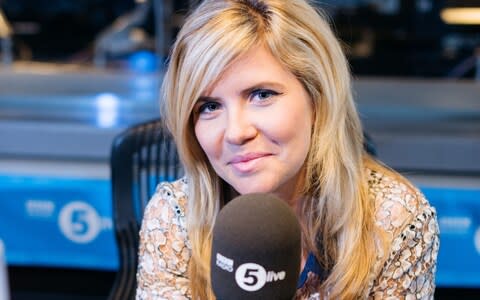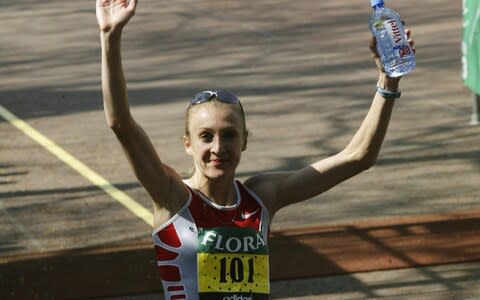I struggle to keep active with endometriosis. Imagine trying to be a sportswoman with the condition?


This month's 12-page Women's Sport Monthly focuses on the invisible health issues affecting sportswomen. It will be published in tomorrow's paper with exclusive interviews and features rolled out online over the next seven days. To kick off our issue, Emma Barnett talks about her endometriosis diagnosis and why we need to talk about periods.
There have only been two times in my life where I have been genuinely grateful for my period: the production of our son and school swimming lessons.
It is safe to say I have had a stormy relationship with my period since it showed up when I was 10 in a nippy loo in Manchester’s House of Fraser.
From the off it made me feel nauseous, weak-legged and wracked with pain, month in and month out. I tried everything to dampen its grip on me – until peace briefly broke out as I stumbled upon the one pill my body and mind could tolerate. But then we were back to our bloody war once we started trying to have a child, and my period au naturel returned with a vengeance.
It scarily and slowly dawned upon me, two and a half years into trying and failing to conceive – with nothing apparently awry with myself or my husband – that something was deeply wrong.
At 31, a full 21 years after that first bleed, I was finally diagnosed with endometriosis – a condition where tissues that represent like the womb, should leave the body but do not and build up inside women, sticking to various organs. While the disease which affects at least one in 10 women and takes a shocking average of seven years to diagnose, presents differently in each woman – the hallmark of the condition is excruciating, bone-deep, knuckle-dragging pain. And women with it can struggle to conceive too. Doctors do not know what causes it. Nor can they cure it. There has been scant research dollars spent on trying to solve this major health complaint – which women silently live with and fight – compared to say the vast amounts of research into how to manage Type 2 Diabetes, which affects the same number of people.

In the end we did manage to get pregnant through IVF; I share that news with great tenderness of feeling towards those endo sisters and those who are not still on that galling fertility journey. Hence the gratitude that my period kicked in for some semblance of a functioning menstrual system.
But there is another irony in how I used to feel getting my period before swimming lessons, thus providing the perfect alibi to avoid a cold school pool. Now I would love nothing more than for my periods to bugger off for good, so I could be one of those people who runs half marathons or goes for an easy jog every day.
While I do more gentle forms of exercise like pilates (when I am not in election mode or in the run up to Christmas – those two things combined this year are a real fitness killer in my line of work), cardio can be tough for people with an autoimmune disorder that leads to chronic pain. Doctors and physiotherapists advise swimming and anything which is non-aggravating to my body.

My endo is not as nearly as bad as many women’s. But what about women who want to lead active lives and sportswomen with endo or particularly heavy, difficult periods? I have written an entire book about periods – filled with hilarious, tragic and maddening tales of women which have never been told before through this prism. Periods remain in a box stubbornly labelled taboo which means that we have not been able to cry about them or laugh about them either.
And when other areas of life collide with periods – like politics or sex? The taboo gets worse. Nowhere is this more prevalent than sport and periods. It is one of the greatest menstrual taboos – purely because it is a world predicated on strength, showing no weakness and never letting your body do anything you do not want it to. The world of competitive sport is not designed with women in mind. And certainly not with menstruating women in the mix.

This is how crazy things like this happen: Fu Yuanhui, a Chinese swimmer, was hailed a “revolutionary” in 2016 when she talked about competing at the Rio Olympic Games on her period, after she and her team-mates came fourth in a relay race. At first she could not be found to do the interview as she was crouched behind a board, hunched over in pain. When located and able to talk, she said: “I didn’t swim well enough this time,” and apologised to her team-mates. “It’s because my period came yesterday, so I felt particularly tired – but this isn’t a reason, I still didn’t swim well enough.”
A “revolutionary”. Really? Fu should feel it is OK to talk about her body doing its thing. It should not be seen as breaking the mould. But break it she did. Of course women still can and do perform amazingly on their periods. The former marathon world record holder Paula Radcliffe first broke the record in Chicago in 2002 while fighting period cramps in the last third of the race.
But she has spoken out about how little periods and the effects they have on elite athletes are still understood. She felt motivated to do so after she learned that British Athletics had given the runner Jessica Judd a drug called norethisterone to delay her period at the 2013 World Championships.

This was a course of action Paula condemned as a leader in her field and someone who had tried the drugs herself to no avail. In fact she said the drug made her feel “a hundred times worse”, an account which tallied with Jessica’s recollection of events. Speaking to BBC Radio 5 Live about the incident, which happened when Jessica was 18 years old, she explained: “Leading into it, I was on norethisterone which was delaying my period from starting. I had spoken to Paula Radcliffe about it and we were really trying to find ways to go around it. I sat down with British Athletics doctors and they found this drug called norethisterone. I took that and I think it played with my hormones more. I had to risk taking that. I thought whatever happens it’s going to be better than being on my period. But it still affected me, I still felt heavy legged. Especially after the race I was very emotional. I definitely wasn’t myself that day.”
Jessica went on to say that the effects of her menstrual cycle can be “the difference between finishing first and last”. She said she was “comfortable” with the decision to take norethisterone as it was the “best option at the time”. The sporting world is a long way from figuring out some form of unofficial or official menstrual policy on what has been termed the last taboo in the field by Britain’s former tennis No 1 Annabel Croft, but a better solution can only be getting nearer as more and more athletes speak out openly about the challenges their periods present.

This is instead of pretending they do not happen, or burying them beneath debilitating hormones. And more research will hopefully be done with both female and male doctors now involved in sports science. It is easy to write off the period taboo as something from the old ages. But when one of the world’s richest and most forward-thinking companies, Apple, forgets about periods while launching its health kit app in 2014, you know there is a deeply ingrained problem. You do not simply forget to include a menstrual tracking function in an app billed as the ultimate health suite for all of one’s bodily functions.
Periods still have yet to be written into the mainstream picture and as part of women’s existence. Ignoring them only takes us so far. And it’s high time we faced the elephant in the room. Sporting women should lead the way with our support. Because, remember, a woman who is honest about her flow is anything but weak. She is the epitome of strength.
Emma Barnett hosts Newsnight and The Emma Barnett Show Monday-Thursday 10am-1pm on BBC Radio 5 Live. Her debut book, Period. It’s About Bloody Time, is out now.

 Yahoo Sport
Yahoo Sport 





































